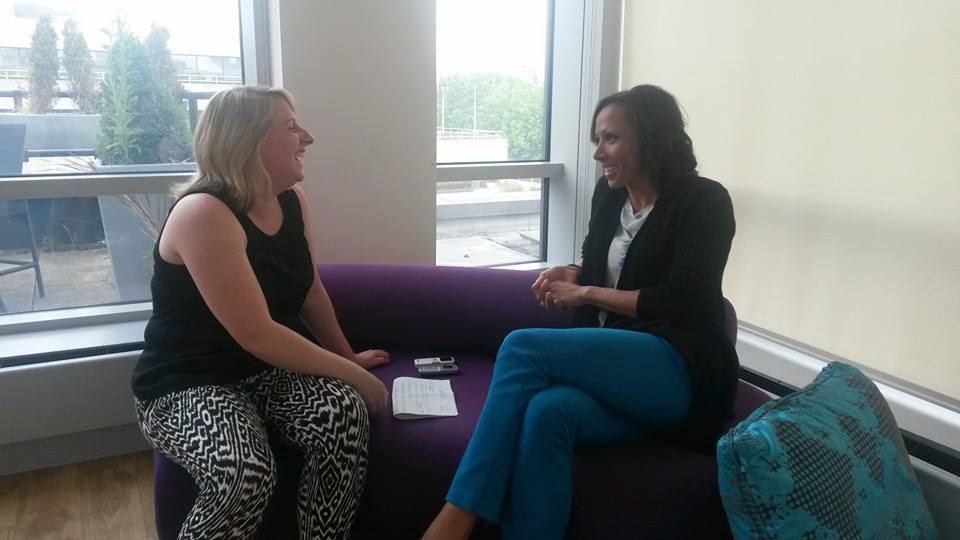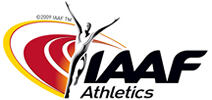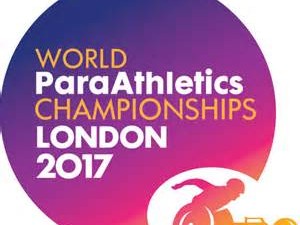
WRITTEN FOR THE BRITISH ATHLETICS BIRMINGHAM GRAND PRIX & IAAF DIAMOND LEAGUE EVENT PROGRAMME
To commemorate the ten-year anniversary of Dame Kelly Holmes’ remarkable double gold medal achievements at the 2004 Athens Olympic Games this week, Nicola Bamford spoke to the champion who has shone both on and off the track since her date with athletic destiny a decade ago.
The 44-year-old from Kent became only the third woman in Olympic history to win both the 800m and 1500m events in the Greek capital, representing Great Britain’s first double gold medallist since the 1920 Games in the process.
Holmes had endured years of an endless catalogue of career-threatening injuries together with chronic fatigue syndrome, which spiralled into self-harm and depression in the countdown to her finest hour.
But the army-sergeant-turned-track-star refused to give up her lifelong dream of Olympic glory – blissfully unaware that she would be rewarded twice as handsomely during that spectacular August week.
It is this very same relentless resilience and determination which has formed the backbone to Holmes’ equally-impressive business career since her competitive retirement that has helped to create arguably one of the most impressive careers in sport during a glittering ten-year period since her heyday on the track.
Turning Point
The unwavering ambition and exceptional work ethic which propelled Holmes to those life-altering days in the summer of 2004 are traits which originated from her days in the Women’s Royal Army Corps, which she joined at aged 18 first as a lorry driver and then as a personal training instructor.
An Army judo champion, Holmes was a natural runner from the beginning and so as not to embarrass the other women, she competed against the men in 1994 – a year after her first British 800m crown and her major international championships debut as a semi-finalist in the World Championships 800m in Stuttgart – which helped her to progress by a remarkable 16-seconds to a 4:01.41 1500m clocking in just two races to enter world-class territory.
Before funding allowed her to leave the forces and train full-time in 1997, the Dave Arnold-coached runner managed to combined both her work and athletics to capture the 1994 Commonwealth 1500m title in Victoria and European 1500m silver medal in Helsinki in a breakthrough year which proceeded her first global medals in 1995 – a World Championship silver and bronze in Gothenburg over 1500m and 800m, respectively.
The following year, the Ealing, Southall and Middlesex athlete enjoyed her first taste of the Olympic arena in Atlanta but – hindered by a stress fracture – finished an agonising fourth in the 800m – in addition to eleventh position in the 1500m – only one season after registering her 1:56.21 British record.
“Coming fourth and losing the bronze by only a tenth of a second was awful but equally, it drove me to want to be better, having achieved what I did whilst running in pain with a stress fracture,” Holmes explained.
“I often wondered what had gone wrong (with my long list of injuries) but I think biomechanically, I’m a forefoot runner so there was a lot of pressure going through my calves, Achilles and back just by the way I ran, and secondly to be the best, you have to train hard but you don’t know where your absolute limit is – I was always at that absolute cusp of that fine line because I was always training hard to perfect my fitness.
“Then, 1997 was a special year as I came out thinking I had to do something good after running the Olympics injured, and that was when I set the British 1,000m record (with 2:32.55) and broke the British 1500m record in Sheffield two weeks later (with 3:58.07) which had been held by Zola Budd, the two-time world cross country champion for twelve years, so that was a major milestone and a big turning point in my career.”
Losing Sydney to Athens Goal
Following two injury-plagued years which resulted only in a Commonwealth 1500m silver medal from the 1998 Kuala Lumpur Games, Holmes returned to action in time for the 2000 Sydney Olympics – eager to not miss out on a medal again.
Despite only having recorded six weeks of training under her belt beforehand, the ever-gutsy performer managed to exceed expectations once more – storming to a plucky 800m bronze – and seventh place in the 1500m – to finally gain her Olympic redemption from four years previous.
“I did a lot of cross-training in the pool, the gym and on the bike – anything to get as fit as possible and I knew how to run so just knuckled down for six weeks,” Holmes recalled.
“I didn’t think I’d be at those Games so to come away with a bronze having led with 50m to go, was great. I’m actually glad I didn’t win as I wouldn’t have done Athens.”
Indeed, it appeared that fate had an – often seemingly cruel – plan in Holmes’ rollercoaster career and all roads were leading to Athens.
Only sixth in the following year’s World Championships 800m final in Edmonton, Holmes went on to collect European 800m bronze in Munich and Commonwealth 1500m gold Manchester in the 2002 season before adding a second trainer to her support network in the shape of American, Margo Jennings.
Training under Jennings and alongside Mozambique’s Maria Mutula – the 2000 Olympic 800m champion – in South Africa, Holmes’ new set-up reaped her rewards, taking world indoor and outdoor 1500m silver Birmingham and Paris in the 2003 campaign.
The 14-time British champion was evidently reaching the peak of her career, establishing three more British records – 4:02.66 for 1,500m indoors, 1:25.41 for 600m and 2:32.96 for 1,000m indoors in the months leading up her final Olympic appearance.
“I’m proud to still hold so many records but they are there to be broken,” revealed Holmes.
“I think I could have gone faster and faster more often as having the injuries didn’t help me reach my best – had I not had those struggles, I would have been at my absolute best and won the gold more often.”
Shock and Relief
Holmes’ 2004 season began with a fall and subsequent ninth-place finish at the World Indoor Championships in the spring, further fuelling her on to chase sporting history.
In Athens, aged 34 – in the space of eight days and across eight races – she had achieved athletics immortality, clinching the 800m gold medal on August 23rd in 1:56.38 followed by the 1500m crown on August 28th in a 3:57.90 British record.
Having only decided to compete in the two-lap event just five days earlier, Holmes recalled:
“I just wanted to be wrapped up in cotton wool as I was so desperate to get to the Games in one piece, and because the training camp up in Aphrodite’s Hill in Cyprus was just amazing, I knew I was in the shape of my life but deciding to do both the 800m and the 1500m was huge risk as the 800m was first and I wanted to win the 1500m so badly.
“I was risking everything I’d ever wanted but I believed I could get a medal in each but I’d never imagine I could get two golds.”
In the days and hours leading up to the biggest moments of her life, she repeatedly played her favourite song, “If I Ain’t Got You” by Alicia Keys to constantly remind herself of her goal, and Holmes has since had the word ‘Angel’ tattooed on her shoulder, stating:
“In the 1500m, it felt like I was floating – I didn’t recognise anybody – they were all silhouettes, it literally felt like a tonne of weight had been lifted off my shoulders when I crossed the line in first place, it was so bizarre.
“That’s why I believe in fate – I’m not religious but that’s why I have the tattoo.”
Holmes’ tactics of running at the rear of the field before storming through in the latter stages paid dividends in both finals, stating:
“I believed I could run a good race if I ran consistent splits – they were all very close and I won in the time I thought I’d run but doing it front the back of the pack behind those erratic times ahead of me, proved it was the right thing to do so I did the same again in the 1500m as it worked.
“I’d been running for so many years so my strength was my tactical awareness – knowing how to read a race helped me a lot.”
On her two most special races in a 12-year career, Holmes continued:
“The first race was shock – I remember thinking ‘jeez, I still can’t believe I won it’ – there were so many great specialist 800m runners in that race.
“The 1500m was complete relief, knowing I’d finally done and a dream come true – I believe in fate and hard work, so maybe it was meant to be after my journey.
“Without a doubt, if I hadn’t have won I’d still have been proud of my career but winning the gold definitely cemented everything I’d believed in and made everything I’d been through worthwhile – putting my whole life and soul into it, it topped off a career being born for running.
“Also the programmes with young people I’ve ran, it makes what I say more credible – having the ability to have people listen because they believe in you.”
With her hero, 1980 and 1984 Olympic 1500m champion, Seb Coe – the inspiration she names for both her Olympic dream and her sports business career – presenting Holmes with her 1500m silverware, she recalls that moment together with him taking her spikes off for her as another surreal moment to treasure.
Holmes – who on the eve of the Games, was admitted to hospital with a suspected heart attack which turned out to be a nasty bite from a black millipede – additionally recalls her speed with pride:
“In Athens, I ran my second-fastest 800m and my fastest 1500m ever which were the biggest shocks ever – to still run those times after all of those years made me so proud.
“2004 was the only year I didn’t get injured so everything came together and I ran at my best.
“All of the setbacks I had in my career, I always came back at the major championships and got a medal in all but one so they made me want to do it more because I always remembered where I’d come from.
“I always believed I could be the Olympic champion.”
After her Grecian heroics, Holmes was given the honour of carrying the British flag at the Olympic closing ceremony and she returned to her hometown of Tonbridge to an estimated 40,000-strong homecoming parade.
Ten Lives after Track
The following summer, the golden girl of British Athletics decided to hang up her spikes after her final race in Sheffield, where she limped home with another Achilles issue ahead of a lap of honour in a motorised buggy and an Army helicopter escort.
Having been made a Dame in 2005, life for Holmes has been far from quiet, though – she has since been inducted into the England Athletics Hall of Fame, become President of Commonwealth Games England and released a fitness range.
Not content to juggle any less than her desired ‘ten lives’, Holmes also runs her charity the Dame Kelly Holmes Legacy Trust, is a patron of the Jaguar Academy of Sport and manages numerous Kelly Holmes Education programmes.
Having mentored many of Britain’s best young middle-distance stars in the past via her On Camp with Kelly initiatives, Holmes’ latest venture is one she describes as her toughest yet – opening a coffee shop.
Located in the same building which once employed her as a paper-girl in her teenage years, Holmes has overseen the project management of the build and the commercial property will open on August 28th to coincide with the anniversary of her second gold medal.
The coffee shop – in the Hildenborough area of Tonbridge – will be named ‘Cafe 1809 Hildenborough’ in reference to the bib number she wore in all of her races in Athens.
“I’ve done lots of things in the last ten years, some I’ve had to learn a lot about but changing your mind-set in order to succeed is a good challenge,” Holmes explained.
“The charity is probably one of my proudest things I’ve done since retiring as I had the vision of what I wanted to achieve and we’ve passed expectations – we work nationally and have helped over 100,000 people and the transition of 250 athletes.
“The shop’s been my biggest challenge ever because I’m a perfectionist and a bit of a control freak.
“I love the construction industry as I’ve done up houses before – it’s taken forever but I’ve wanted to do it for years and I tried to buy it for 15 years.”
On what she believes makes her tick, Holmes offered:
“I do believe that drive and determination is embedded in me. I have to push myself to prove to myself – I set my markers really high and I always believe you’re on a learning curve on your way up there so when you get to the top, you value it more.
“In athletics, I was exactly the same – there was a lot of things I could have given up on but winning those two golds after such a long rollercoaster ride, made me value that even more and learn how to deal with the challenges I’m picking up as I go in business.
“I use my drive to better myself and hopefully that rubs off on others as well. Everyone gets nervous but it’s about controlling all those worries inside of you, as everyone else is in the same boat so that’s how I dealt with it.
“It’s the one who deals with their nerves the best that will succeed. I always think of solutions rather than problems.”
And Holmes – who is just as regimented nowadays with daily sunrise visits to the gym – still scratches her competitive itch, having taken up the duathlon with marked success this year and even has the possibility of a berth on the British age-group team for an international championship on the horizon.
But for now, Holmes is content to bask in the golden glow of her ten-year anniversary over a quiet family celebratory meal, reminiscing about a glittering decade and the fascinating journey she took to arrive there.



